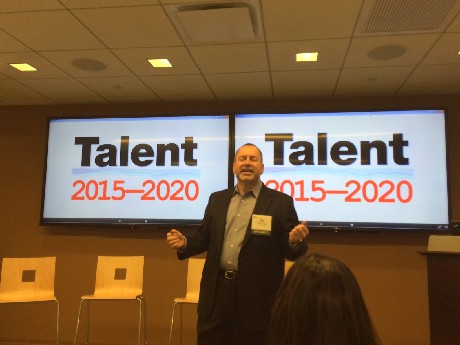IT HR and Workforce Development Ripe for Disruption, NJTC Members Told

“There are companies that are totally blowing apart everything you know about talent management, talent recruiting, how human resources is done, how leadership development is done. All of these practices are being disrupted,” said Bill Jensen, founder and CEO, The Jensen Group to members of the New Jersey Tech Council.
Jensen made his remarks on Jan. 22 at a workshop called Trends, an in-depth look at today’s workforce, which took place at Juniper Networks OpenLab, in Bridgewater.
Introducing the workshop, James Barrood, president and CEO of the NJTC, pointed out that the topic of talent and workforce development is so important to New Jersey tech companies because access to talent is one of the state’s prime competitive advantages.
Jensen, whose company sponsored the study called “The Future of Work,” told the group that everything they currently know about their jobs, all the skills they currently have, and everything they feel about their work will be disrupted in the next five years.
People fall into one of two camps, he said. They are either thrilled at the possibility of disruption or they are upset by it. Most people have a mixture of the two emotions.
“All of these emotional filters are OK to have. I’m asking you to get comfortable with which is your strength and which is your weakness,” he said. “You have to know your strengths, skills and desires. Think of it as a percentage deal.”
Whether you are transitioning into the future of work or creating the future, everyone will have to leave his or her comfort zone, Jensen added. He then asked the group to imagine the disruptions that could affect them personally and to get themselves out of their comfort zone.
Jensen provided some examples of disruption on a company scale. One example came from an executive at Accenture who wanted his company to do more in Third World countries. He developed a program that asked employees to take a 50 percent pay cut to spend time in a Third World country and develop themselves as leaders there by serving something else besides the company. It turned out that the executives who volunteered for this program were the same people whom management had identified as superstars, people they were interested in retaining for the next ten years.
Jeff Bezos, of Amazon.com didn’t want to spend money to retain employees, so he decided instead to pay people up to $5,000 if they would leave. “He is trying to say to his staff, ‘are you in or are you out,’” without dealing with fancy retention practices that might or might not work, Jensen said.
Zappos is trying out an alternative to traditional job interviews. The company asks candidates to sign up with and collaborate on an internal social network. Their participation in the social network is then monitored by hiring managers, who are looking for people who “get it,” according to Jensen. “They are reinventing job postings just by saying they aren’t going to do them anymore.”
Jensen then challenged the group to look for an aspect of their work that was ripe for disruption, and that should be completely disrupted. Most of the group found something.
One audience member said that the tracking of paid time off should go away. Another said that software that could consolidate all social media for a job candidate into one place would be disruptive. And another said that performance appraisals needed to be changed. Jensen agreed. About practices that should be disrupted, he said, “We all know they’re dead, we all know they’re stupid, yet we all keep doing them.”
Jensen then challenged the group to get out of their comfort zones and work on the next generation of procedures that will change the way HR professionals work. “Create the space to have conversations you are not having now,” he advised.
Members of today’s workforce don’t need companies in the same way they did in the past, he said, because the corporate infrastructure is available on a cell phone. Companies that focus on getting to know employees and helping them achieve their dreams will retain excellent employees, he added.

After Jensen spoke, a panel of HR professionals who place tech workers discussed their challenges and how their jobs are changing. The panel members were: Lanier Dalencourt, senior human capital consultant, TriNet; Christina Giglio, division director, Robert Half; Glenn Guensch, cofounder and managing partner, RennerBrown; and Crystal Lannaman, HR Director, Corporate Functions, BASF.
The good news for IT professionals is that the panel all agreed that the job market has changed since the recession—in favor of the job seekers. At tech companies, “Seven years ago, you had the pick of the litter. You could take your time in making a decision,” Giglio said. “The employees you did have, had to stay there.” Now it’s a candidate’s market and your best employees are taking calls every day. Things like offering flexible schedules, great benefits and increased compensation are now important.
Companies are becoming more creative in how they get employees into the pipeline. Some have started to engage with high school students to get them excited early, and to try to lead them into their company. Lannaman said that BASF is tapping promising high school students, offering internships and a relationship with the company.
Job hoppers were also a topic of discussion. “The outlook on job hopping has taken a complete 360-degree turn,” Guensch said. “Several years ago, if someone said they held a series of jobs for two or three years each, it was considered a red flag. Now it’s a red flag for people who stay in a job for ten years. People think they are lazy and not motivated. Companies ask why these candidates haven’t changed job titles and moved up in an organization.”

